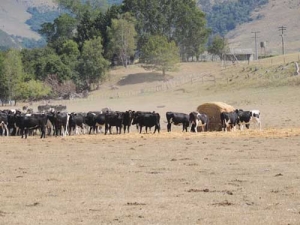NZ Catchment Groups Thrive with ‘Source to Sea’ Approach
The most successful catchment groups in NZ are those that have 'a source to sea' approach.
 Farmers in drought-affected parts of New Zealand will continue to feel the impacts of El Niño for months.
Farmers in drought-affected parts of New Zealand will continue to feel the impacts of El Niño for months.
Despite recent rain, farmers in drought-affected parts of New Zealand will continue to feel the impacts of El Niño for months, as NIWA's latest seasonal outlook indicates.
January and February are usually drier months in Canterbury.
The Ministry for Primary Industries (MPI) is monitoring the weather situation closely and keeping Ministers updated. MPI is working through Rural Support Trusts and industry groups to help understand the impacts and ensure that support mechanisms are in place.
"In many of the drought-hit areas, particularly Canterbury and Marlborough, the rain was a great morale booster," says MPI's director of resource policy David Wansbrough.
"Crop farmers have had a better start to the year, as any good rainfall like this really helps new crop growth. But where pasture has died from over a year of dry weather, more rain will be needed to break the drought and it will be months before production recovers.
"Much of Otago was less lucky and didn't receive the rainfall of their northerly neighbours. In the Strath Taieri, some locals are saying it's the driest they have ever seen it."
Rural Support Trusts are saying that the financial and emotional impacts of the ongoing drought are really starting to pinch for some farmers. Farmers and their families can contact their local Rural Support Trusts on 0800 787 254 for advice and information. Federated Farmers feedline on 0800 376 844 can help get feed to drought-hit farms.
"Farmers are doing a good job of working through their drought management plans. For many, destocking in November and early December means that remaining animals can be kept in good condition even under this pressure," says Wansbrough.
"Driving around the lower and eastern North Island you can see plenty of bales of hay in the paddocks, which shows farmers there have geared up well for a dry summer."
An increasingly dry Northland did well out of recent deluges but has since been hammered by strong easterly winds, which hastens the soil drying out and can damage some crops. Under El Niño, elevated activity in the tropics also means a higher chance that cyclones or ex-cyclones could drop closer to NZ, bringing storms and heavy rain to the top and east of the north island.
MPI continues to monitor soil moisture deficits in the North Island, and is also mindful that many farmers are still recovering from the June storms in Taranaki and Whanganui.
Global trade has been thrown into another bout of uncertainty following the overnight ruling by US Supreme Court, striking down President Donald Trump's decision to impose additional tariffs on trading partners.
Controls on the movement of fruit and vegetables in the Auckland suburb of Mt Roskill have been lifted.
Fonterra farmer shareholders and unit holders are in line for another payment in April.
Farmers are being encouraged to take a closer look at the refrigerants running inside their on-farm systems, as international and domestic pressure continues to build on high global warming potential (GWP) 400-series refrigerants.
As expected, Fonterra has lifted its 2025-26 forecast farmgate milk price mid-point to $9.50/kgMS.
Bovonic says a return on investment study has found its automated mastitis detection technology, QuadSense, is delivering financial, labour, and animal-health benefits on New Zealand dairy farms worth an estimated $29,547 per season.
OPINION: Staying with politics, with less than nine months to go before the general elections, there’s confusion in the Labour…
OPINION: Winston Peters' tirade against the free trade deal stitched with India may not be all political posturing by the…